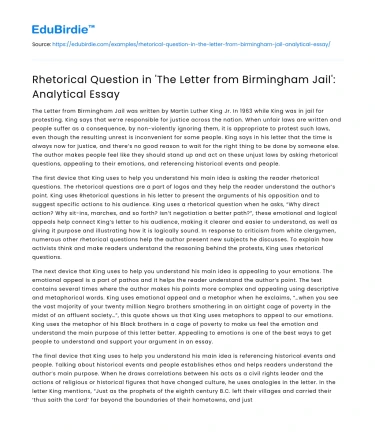The Letter from Birmingham Jail was written by Martin Luther King Jr. In 1963 while King was in jail for protesting. King says that we’re responsible for justice across the nation. When unfair laws are written and people suffer as a consequence, by non-violently ignoring them, it is appropriate to protest such laws, even though the resulting unrest is inconvenient for some people. King says in his letter that the time is always now for justice, and there’s no good reason to wait for the right thing to be done by someone else. The author makes people feel like they should stand up and act on these unjust laws by asking rhetorical questions, appealing to their emotions, and referencing historical events and people.
The first device that King uses to help you understand his main idea is asking the reader rhetorical questions. The rhetorical questions are a part of logos and they help the reader understand the author’s point. King uses Rhetorical questions in his letter to present the arguments of his opposition and to suggest specific actions to his audience. King uses a rhetorical question when he asks, “Why direct action? Why sit-ins, marches, and so forth? Isn’t negotiation a better path?”, these emotional and logical appeals help connect King’s letter to his audience, making it clearer and easier to understand, as well as giving it purpose and illustrating how it is logically sound. In response to criticism from white clergymen, numerous other rhetorical questions help the author present new subjects he discusses. To explain how activists think and make readers understand the reasoning behind the protests, King uses rhetorical questions.
Save your time!
We can take care of your essay
- Proper editing and formatting
- Free revision, title page, and bibliography
- Flexible prices and money-back guarantee
The next device that King uses to help you understand his main idea is appealing to your emotions. The emotional appeal is a part of pathos and it helps the reader understand the author’s point. The text contains several times where the author makes his points more complex and appealing using descriptive and metaphorical words. King uses emotional appeal and a metaphor when he exclaims, “…when you see the vast majority of your twenty million Negro brothers smothering in an airtight cage of poverty in the midst of an affluent society…”, this quote shows us that King uses metaphors to appeal to our emotions. King uses the metaphor of his Black brothers in a cage of poverty to make us feel the emotion and understand the main purpose of this letter better. Appealing to emotions is one of the best ways to get people to understand and support your argument in an essay.
The final device that King uses to help you understand his main idea is referencing historical events and people. Talking about historical events and people establishes ethos and helps readers understand the author’s main purpose. When he draws correlations between his acts as a civil rights leader and the actions of religious or historical figures that have changed culture, he uses analogies in the letter. In the letter King mentions, “Just as the prophets of the eighth century B.C. left their villages and carried their ‘thus saith the Lord’ far beyond the boundaries of their hometowns, and just as the Apostle Paul left his village of Tarsus and carried the gospel of Jesus Christ to the far corners of the Greco Roman world, so am I compelled to carry the gospel of freedom beyond my own hometown.”, King makes a good argument for his cause by making this comparison and encourages his readers to consider carefully their perception of a criminal and terrorist. King borrows from the ethos of these figures to gain credibility in front of his readers. King was a Baptist preacher who was influenced by moral ideology to use non-violent methods in the civil rights movement, and it is not very surprising that his letter is full of religious references.
By posing rhetorical questions, appealing to feelings, and citing historical events and figures, Martin Luther King Jr. makes people feel like they should stand up and act on these unjust laws. King uses ethos, pathos, and logos to help us understand these unjust laws against African Americans. King makes the argument that these unjust laws should not be waited on to be fixed by someone else, but the time is now for justice. Martin Luther King Jr. Was a great public speaker, the best civil rights activist, and a beautiful writer who stood up against unjust rules and laws and he will be known as one of the most important men in United States history.






 Stuck on your essay?
Stuck on your essay?

